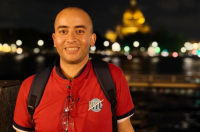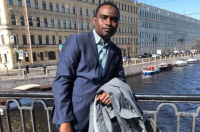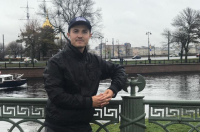Omar, thank you for joining us. Let’s start with your introduction.
Thank you for the invitation. I am a passionate cybersecurity researcher and a PhD student at ITMO University. My research primarily focuses on AI-driven security, cyber threat analysis, and data privacy in healthcare systems. In addition to my academic work, I also serve as the Chief Technology Officer (CTO) at Centrynex Cybersecurity Limited in the UK, where I lead a team focusing on developing next-generation security frameworks.
Where are you from?
I was born in Kabul, Afghanistan, but I’ve spent many years living in Dubai. Growing up in such diverse environments has given me a broad perspective on technology, education, and innovation. Despite its challenges, Kabul is a city rich in history and culture and it has always been home to some of the most resilient and talented individuals I’ve met.
What was your academic journey like before joining ITMO?
I completed my Bachelor's degree at Preston University in Pakistan on a scholarship. After that, I applied for the Open Doors Scholarship, which opened the door for my Master's studies at ITMO University in St. Petersburg, Russia. During my Master's, I had the incredible opportunity to be an exchange student at Eurecom, ITMO’s partner university in France. There I was warmly welcomed by Mr. Philippe Benassi and Professor Maurizio Filippone – two of the kindest and most supportive mentors I’ve ever had. Just like ITMO, Eurecom felt like home.
After completing my Master’s, I once again applied for the Open Doors Scholarship and successfully secured a PhD position. I was fortunate to continue my research under the guidance of my Master's supervisor, Professor Viktoria Korzhuk, whose mentorship has been invaluable throughout my academic journey.
Why did you choose to pursue your PhD in Russia, and more specifically at ITMO?
The research opportunities, state-of-the-art facilities, and international academic environment made it an ideal choice for me. My experience during the Master’s program was incredibly positive. Although I faced some initial challenges, such as language barriers in certain courses, the university’s supportive academic culture helped me overcome them. That experience reassured me that ITMO was the right place to continue my research.
Your research focuses on cybersecurity and AI-driven security solutions. What motivates you to work in this field?
Cyber threats are evolving at an unprecedented pace, especially with the rapid integration of AI into various industries. My research focuses on cybersecurity, ethical hacking, penetration testing, and data privacy – particularly in AI-powered healthcare systems. Healthcare is one of the most sensitive domains when it comes to data security. The increasing reliance on AI in medical applications presents both opportunities and risks. My motivation comes from the urgent need to protect digital infrastructure and ensure the privacy and security of AI-driven healthcare systems.

Photo courtesy of the subject
Can you talk a bit about your current research project and its potential impact?
My research revolves around enhancing data privacy in AI-driven healthcare solutions. I’m currently working on developing novel security algorithms and techniques to protect sensitive patient data in IoT-based healthcare networks. The goal is to create more secure and trustworthy healthcare systems. If successful, my work could help hospitals, medical institutions, and governments implement stronger cybersecurity frameworks, ultimately improving data protection in the healthcare sector.
What has your experience as a PhD student at ITMO been like?
It has been an intellectually stimulating and rewarding journey. ITMO offers exceptional research facilities, opportunities for collaboration, and a highly supportive academic community. While there were initial challenges, the university’s research-oriented culture and welcoming environment made it easier to adapt and excel.
Have you had opportunities to collaborate with international researchers or participate in conferences?
Yes! I have collaborated with researchers worldwide and published several papers in high-impact journals. I’ve also had the chance to present my research at various international conferences, including the 18th International Conference on Public Health Informatics in Paris, France, where I was awarded the best presentation award. These experiences have been invaluable in expanding my network and refining my research. I also have upcoming conferences in 2025, such as the GCCSCE (Calgary, Canada) on April 26, 2025, the IEEE-ICOICC (India) on May 2-3, 2025, and the IEEE-EMBS (Denmark) on July 14-17, 2025.
What were your published papers about?
Some of my key publications focus on secure data sharing in healthcare, novel security algorithms for AI-driven healthcare, and innovative approaches to cybersecurity in medical applications. Additionally, I have a few upcoming Q1 journal publications, including one about a brain stroke prediction model and another – about secure communications based on novel resonators and grey wolf optimization

Photo courtesy of the subject
What are your plans after completing your PhD?
I plan to continue working in cybersecurity, either in academia or the industry. My goal is to develop AI-driven security frameworks that can protect critical infrastructure on a global scale.
What advice would you give to students considering a PhD at ITMO?
Be proactive, seek out research opportunities, and build strong connections with professors and industry professionals. ITMO provides an excellent platform for academic and personal growth, but success requires dedication and initiative.
Finally, is there anything else you’d like to share?
A PhD is a challenging yet incredibly fulfilling journey. ITMO University offers a supportive and innovative environment that makes the process worthwhile. Whether in terms of research, networking, or personal development, ITMO is more than a university – it’s a place that truly feels like home.




